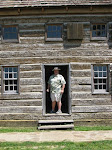Today is the birthday of Frederick Delius (1862-1934) a personal favorite among the classical composers. It's difficult to categorize Delius's music. In 1929 The New York Times wrote this about him:
Delius belongs to no school, follows no tradition and is like no other composer in the form, content, or style of his music.
Almost a century later the quote remains intact.

His impressionistic music aligns him with the English school but he has a significant place in American music history having been the first classical composer to use musical themes of black Americans in the South. Those themes appear in several of his composition more than forty years before George Gershwin and Porgy and Bess. All of his work is rich, melodic, and complex. It is demanding music for the conductor, performer and listener alike, and music that demands an acquired appreciation. Today, his popularity continues to grow but I believe he remains a relatively obscure figure in 20th century music outside of Great Britain.
From his days as a orange plantation manager at Solano Grove on the St. Johns River south of Jacksonville, Florida:
His musical setting of the words of Walt Whitman:
The occasion of the 150th birthday of the composer in 2012 gave rise to several special programs, concerts, and documentaries. The best of the lot in my opinion is filmmaker John Bridcut's BBC documentary, Delius: Composer, Lover, Enigma. Granted it is ninety minutes long but it is first-rate work in every respect and a far better way to explore Delius than to read about him. I hope you will take the time to watch even if you have to do it in two or three segments. If you enjoy the classics and American music history you will not be disappointed.
Sources
Photos and Illustration:
painting of Delius by his wife, Jelka Rosen, painted in Grez-sur-Loing, France, 1912. Grainger Museum, University of Melbourne, Australia

No comments:
Post a Comment